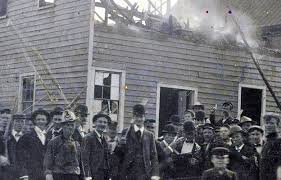Kieran Haile was about 16 when an uncle handed him a book and mentioned a personal connection.
He said, “one of our granddads got chased out of town,” Halle recalled.
He promptly shrugged it off, as busy teens tend to do. The book told about the Wilmington, N.C., insurrection (shown here) and massacre of 1898, which is profiled in a PBS documentary at 9 p.m. Tuesday, Nov. 12. At first, Haile considered that just another nasty footnote to history.
“Part of me was like, ‘Okay, so what?’” he told the Television Critics Association. “’Like, Black people have always suffered … Why should my family be any different?’” But this was very different. His great-great-grandfather ran the newspaper for a thriving Black community that was shattered by a mob.
What happened was a massacre, similar to the 1920 one in Tulsa, Oklahoma, said Crystal Sanders, a Black history professor at Emory University. “The key difference is that Wilmington was a coup. This was the overthrow of a duly elected, biracial government.”
And the key target was Alex Manly, Haile’s great-great-grandfather.
In Wilmington, he was editor and publisher of the Daily Record, which billed itself as “the only Negro daily in the world.” The paper took strong stances, including a pivotal one in August of 1898.
Another Wilmington paper had reprinted a woman’s speech that called for the lynching of Black men who had sex with white women. Manly called this the view of “carping hypocrites” who “cry aloud for the virtue of your women, while you seek to destroy the morality of ours.”
Two months later, after the election of a biracial slate of candidates, a lynch mob was formed. Manly and his brother fled in time; their printing press was destroyed and their office was burned down.(Shown here are the insurrectionists, posing with the remains.)
Then the mob attacked others. More than 2,000 people left town, including the elected officials. Others (estimates have ranged from 14 to 300) were killed; businesses were burned.
The site of the paper remains empty (with a historical marker), 124 years later. Only eight copies of the Daily Record have been found, said Brad Lichtenstein, who co-directed the PBS film for “American Experience.” The eighth was preserved by Manly’s wife, who tore it into tiny pieces and put it in an envelope. Much later, it was “lovingly pieced together by an archivist.”
After the massacre, voting restrictions were passed and segregation took hold. The people who were forced out of town found new lives. Alex Manly was a painter and an activist; his brother taught at Tuskegee University.
But survivors lost something that many white people take for granted – a chance to pass along homes and businesses to descendants. “There’s great generational wealth lost in Black communities,” Sanders said.,
Haile, a musician and recording engineer, agreed (“I would love to be a Rockefeller”), but points to another loss:
Alex Manly had a potent newspaper, which descendants would have savored. “Most of my family is creative …. What was lost was that platform.”

A massacre’s impact resonates through history
Kieran Haile was about 16 when an uncle handed him a book and mentioned a personal connection.
He said, “one of our granddads got chased out of town,” Halle recalled.
He promptly shrugged it off, as busy teens tend to do. The book told about the Wilmington, N.C., insurrection (shown here) and massacre of 1898, which is profiled in a PBS documentary at 9 p.m. Tuesday, Nov. 12. At first, Haile considered that just another nasty footnote to history.
“Part of me was like, ‘Okay, so what?’” he told the Television Critics Association. “’Like, Black people have always suffered … Why should my family be any different?’” But this was very different. His great-great-grandfather ran the newspaper for a thriving Black community that was shattered by a mob. Read more…